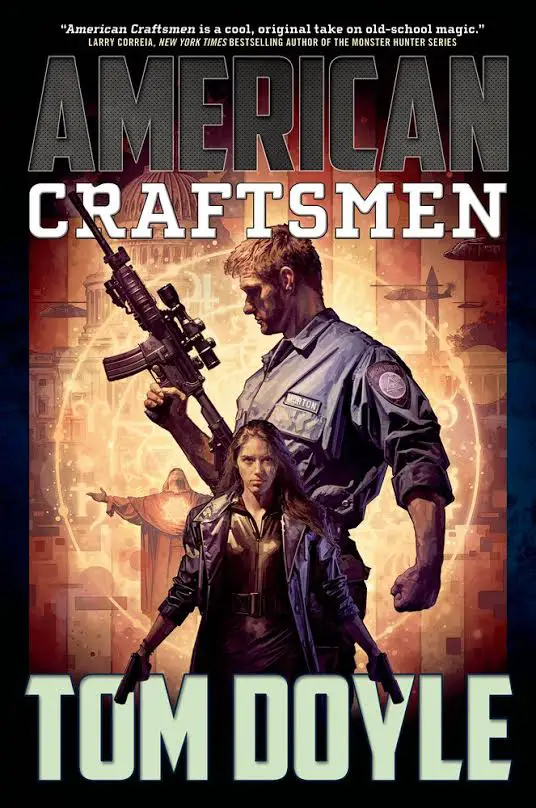American Craftsmen and the Magic in Stories
by Tom Doyle
When I was in high school, late night radio used to feature an ongoing debate between a New Ager man and a born-again Christian woman. I was fascinated. It struck me that both of them were claiming the same sorts of miraculous powers for their respective faiths. I wondered what would happen if people of different beliefs or non-belief really did have demonstrable preternatural power–how would this affect their religious views? I also wondered if two such public opponents could secretly be friends, as in a way they seemed to understand each other’s concepts and language better than anyone else.
Through many twists and turns, these questions from my teenage years led to my debut novel from Tor, American Craftsmen, a modern-day fantasy of military intrigue. The craftsmen of my title are magician soldiers and psychic spies. Like those debating radio personalities, they come from a variety of beliefs. Two of my main characters, Captain Dale Morton and Major Michael Endicott, are from families that have been feuding for hundreds of years, in part because the Mortons have always been pagans or atheists, while the Endicotts have preserved their Puritan heritage. They acknowledge each other’s power, but that doesn’t ultimately affect their differing beliefs regarding the origin of that power. If they can’t be friends, can they at least manage not to kill each other while they serve the country in a time of need?
An underlying belief that both characters unconsciously share is in the power of stories.  They both believe in a positive narrative of the country, but they’re also both aware of a hidden narrative within the classics of early American literature. When Dale and Michael work magic, they use the spells of stories. For example, as in Nathaniel Hawthorne’s The Scarlet Letter, Dale can see the sins of others as glowing letters radiating from their bodies. Endicott wields a sword from Hawthorne’s story, “Endicott and the Red Cross,” and, with no sense of the irony, exercises a power of command similar to that of Satan in Mark Twain’s The Mysterious Stranger.
They both believe in a positive narrative of the country, but they’re also both aware of a hidden narrative within the classics of early American literature. When Dale and Michael work magic, they use the spells of stories. For example, as in Nathaniel Hawthorne’s The Scarlet Letter, Dale can see the sins of others as glowing letters radiating from their bodies. Endicott wields a sword from Hawthorne’s story, “Endicott and the Red Cross,” and, with no sense of the irony, exercises a power of command similar to that of Satan in Mark Twain’s The Mysterious Stranger.
This may remind some of a Star Trek: The Next Generation episode, “Darmok,” in which an alien race spoke legends at each other as their language. In my novel, the crisis comes when the characters realize they need new, future-oriented stories to understand their predicament.
I think it’s only realistic and not metafictional to say that most contemporary characters have some minimal awareness of the sort of life narrative that they’re in during the course of a book, especially in science fiction and fantasy. Like the characters in Don Quixote, they may wonder how their circumstances may differ from the written tale, but that tale won’t be completely unfamiliar. The whole trope of disbelief in the uncanny along with ignorance of its dangers and possibilities that one might see in a B-horror film victim is likely to appeal only to those new to a genre, and in our current cultural moment, very few remain unaware of fantasy and science fiction. For instance, one of my characters, Scherie, is a science fiction and fantasy fan, which helps her adjust to her new, strange situation when she meets Dale and Endicott.
I hope readers of American Craftsmen enjoy a magic that’s not in Latin, but in the language of story. If you’d like to read more about my novel or my other fiction, please go to www.tomdoylewriter.com.
About Tom Doyle:
The Internet Review of Science Fiction has hailed TOM DOYLE’s writing as “beautiful & brilliant.” Locus Magazine has called his stories “fascinating,” “transgressive,” “witty,” “moving,” and “intelligent and creepy.” A graduate of the Clarion Writing Workshop, Doyle has won the WSFA Small Press Award and third prize in the Writers of the Future contest.



